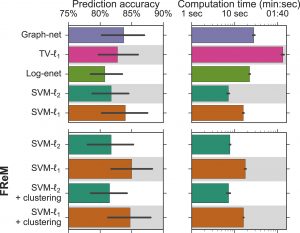Brain decoding relates behavior to brain activity through predictive models. These are also used to identify brain regions involved in the cognitive operations related to the observed behavior. Training such multivariate models is a high-dimensional statistical problem that calls for suitable priors. State of the art priors –eg small total-variation– enforce spatial structure on the maps to stabilize them and improve prediction. However, they come with a hefty computational cost.
Ensembling simple models gives stability and speed. Adding very fast dimension reduction brings spatial structure. Our work, fast regularized ensemble of models (FReM) combines these ideas for fast decoders that are more stable and predict better than the state of the art. Experiments on a large number of brain imaging datasets show this decoder requires less samples to achieve a given level of prediction accuracy.
Publication: FReM – scalable and stable decoding with fast regularized ensemble of models



